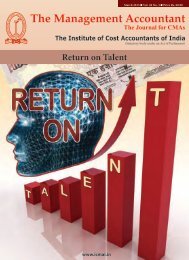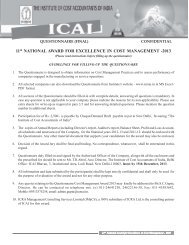This Issue - Icwai
This Issue - Icwai
This Issue - Icwai
Create successful ePaper yourself
Turn your PDF publications into a flip-book with our unique Google optimized e-Paper software.
COVER COVER ARTICLE<br />
ARTICLE<br />
Hospitality Industry, Hospitality Management<br />
and Role of CMA to develop them<br />
Hospitality is the act of entertaining, providing<br />
comfortable facilities to guests, visitors,<br />
customers or any other associated person at<br />
hotels, motels, resorts, clubs, restaurants, tourist<br />
places, business places, airports, railway station, bus<br />
terminus, shopping malls, amusement parks, theatre<br />
halls etc.<br />
Hospitality is now considered to be a first growing<br />
industry. Hospitality management has to ensure better<br />
services in the following areas.<br />
● Accommodations<br />
● Food and beverage<br />
● Organising events<br />
● Organising games and sports<br />
● Organising cultural functions<br />
● Tourism services<br />
● Information required by visitors.<br />
● Hospitality industry has the manyfold potential<br />
to contribute to the economy by —<br />
● Contribution to GDP<br />
● Employment generation<br />
● Foreign exchange earning<br />
● Earning of tax revenues<br />
The World Tourism Organisation (UNWTO)<br />
forecasts that the international tourism will grow at<br />
the average annual rate of 4% [ Source - Long term<br />
prospects : Tourism 2020 Vision ,World Tourism].<br />
Many countries have attempted to build their<br />
international tourism industry because of its potential<br />
to contribute to the national economy through foreign<br />
exchange earnings. A strong association between<br />
international tourism development and economic<br />
performance is hence generally assumed and has been<br />
found in Taiwan. Research studies reported that the<br />
tourism industry was one of major contributors to<br />
Taiwan’s economic growth. Chen et al. (2009), Kim et<br />
al. (2006) and Jang and Chen (2008) revealed that the<br />
tourism sector has contributed more than the<br />
agriculture sector to the gross domestic product<br />
(GDP) in Taiwan. According to the World Travel and<br />
Tourism Council (2009), the aggregate tourism<br />
earnings accounted for 3.46% and 3.34% of Taiwan’s<br />
GDP in 2007 and 2008, respectively. The World<br />
Economic Forum (2009) indicated that Taiwan’s<br />
foreign exchange earning from tourism was US$5.1<br />
Ashoke Kumar Bothra*<br />
billion in 2007 and represented 1.34% of the GDP,<br />
which is higher than the corresponding figures in the<br />
US, Canada, Germany, Japan, South Korea and<br />
China.Kirn et al. (2006) and Chen and Chiou-Wei<br />
(2009) further showed that international tourism<br />
development in Taiwan could promote economic<br />
growth. [Source- International Journal of Hospitality<br />
Management 30(2011) ]<br />
The growth and development of Hospitality<br />
industry vis-a-vis tourism is intensely dependent on<br />
the advancement and the guiding principles of<br />
Hospitality management. Tourism industry in<br />
repercussion helps to grow —<br />
● Hotel industry<br />
● Air, water and land transports<br />
● Tourism services<br />
● Tourist places<br />
● The domestic and foreign markets of local arts<br />
and crafts<br />
The challenges lying in the growth of tourism is<br />
concerned with huge capital deployment and overall<br />
development of infrastructure, which needs a long<br />
term goal. The economic challenges become<br />
commercially viable and acceptable when the same<br />
is globally competitive by introducing a wide range<br />
of measures to improve operational efficiency. CMAs<br />
have a very big role here. They are capable to apply a<br />
number of Cost and management techniques such as,<br />
● Just-In-Time<br />
● Inventory Management<br />
● Budgeting<br />
● Cost-Volume-Profit Analysis<br />
● Linear Programming<br />
● Queuing theory<br />
● Risk Management<br />
● Activity Based Costing<br />
Just-in-time — <strong>This</strong> concept is useful in hospitality<br />
industry at the time of organising big events, like a<br />
conference, a meet on festival, a concert, sports and<br />
games etc. If the different activities are well planned in<br />
advance and the requirements of different inputs are<br />
arrangec in systematic way one can minimise the<br />
carrying cost and wastage and thereby saving ir input<br />
cost.<br />
* FICWA, Practising Cost Accountant<br />
The Management Accountant |September 2011 739




